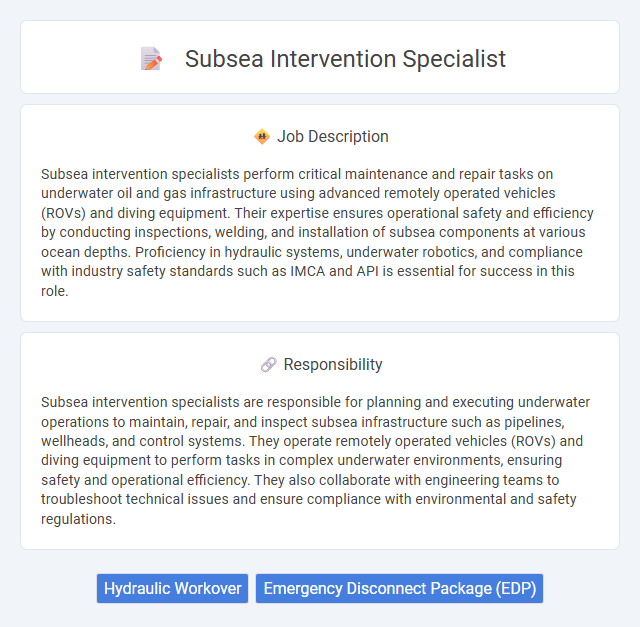
Subsea intervention specialists perform critical maintenance and repair tasks on underwater oil and gas infrastructure using advanced remotely operated vehicles (ROVs) and diving equipment. Their expertise ensures operational safety and efficiency by conducting inspections, welding, and installation of subsea components at various ocean depths. Proficiency in hydraulic systems, underwater robotics, and compliance with industry safety standards such as IMCA and API is essential for success in this role.
Individuals with a strong aptitude for technical problem-solving and a high tolerance for physically demanding environments may be well-suited for a subsea intervention specialist role. Those who are comfortable working in confined, underwater settings under pressure and possess excellent teamwork and communication skills are likely to thrive. However, candidates prone to claustrophobia or difficulty adapting to stressful situations might find the job challenging.
Qualification
A Subsea intervention specialist must possess extensive knowledge in underwater engineering, diving operations, and remotely operated vehicle (ROV) technologies. Certifications such as HSE Offshore Survival, IMCA diving qualifications, and proficiency in subsea tooling are essential for ensuring safety and operational efficiency. Technical degrees in marine engineering or ocean technology, combined with practical experience in subsea construction and maintenance, significantly enhance job performance.
Responsibility
Subsea intervention specialists are responsible for planning and executing underwater operations to maintain, repair, and inspect subsea infrastructure such as pipelines, wellheads, and control systems. They operate remotely operated vehicles (ROVs) and diving equipment to perform tasks in complex underwater environments, ensuring safety and operational efficiency. They also collaborate with engineering teams to troubleshoot technical issues and ensure compliance with environmental and safety regulations.
Benefit
A subsea intervention specialist position likely offers benefits such as competitive salaries, comprehensive health insurance, and opportunities for international travel. The role may provide extensive hands-on experience with advanced underwater technology and equipment, enhancing career growth prospects. Employees could also gain access to continuous training programs, fostering skill development and long-term job security.
Challenge
Subsea intervention specialist roles may involve complex underwater tasks that require advanced technical skills and problem-solving under high-pressure conditions. The probability of encountering unpredictable environmental factors, such as strong currents or limited visibility, often increases the challenge of executing precise interventions. Adapting to rapidly changing scenarios and ensuring safety protocols are rigorously followed is likely critical for successful project outcomes.
Career Advancement
Subsea intervention specialists leverage expertise in underwater engineering and robotics to perform maintenance, repair, and inspection of subsea assets, driving the offshore oil and gas industry's operational reliability. Career advancement in this field often involves acquiring certifications in remotely operated vehicle (ROV) operations, diving proficiency, and subsea engineering, leading to roles such as project manager or engineering supervisor. Gaining experience in complex subsea projects and mastering emerging technologies like autonomous underwater vehicles (AUVs) significantly enhances promotion prospects and salary growth.
Key Terms
Hydraulic Workover
A Subsea Intervention Specialist specializing in Hydraulic Workover manages high-pressure hydraulic systems to perform maintenance and repair on underwater wells, ensuring operational efficiency and safety. Expertise in subsea hydraulic equipment, control systems, and remotely operated vehicles (ROVs) is essential for executing precise interventions in deepwater environments. Proficiency in troubleshooting and maintaining hydraulic workover units plays a critical role in minimizing downtime and extending the lifecycle of subsea production assets.
Emergency Disconnect Package (EDP)
A Subsea Intervention Specialist ensures the safe and efficient deployment and operation of Emergency Disconnect Packages (EDP) during offshore drilling and intervention activities. The EDP is a critical safety system designed to rapidly disconnect subsea equipment in emergency scenarios, minimizing risks to personnel and preventing environmental hazards. Expertise in handling hydraulic, mechanical, and electronic components of the EDP is essential for maintaining operational integrity and emergency response readiness.
 kuljobs.com
kuljobs.com